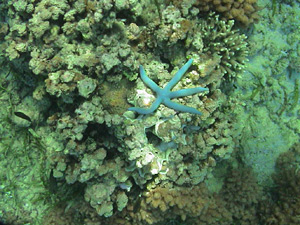 |
 |
 |
 Editorials | Environmental | July 2006 Editorials | Environmental | July 2006  
Fossil Fuels Said to Damage Ocean Life
 Associated Press Associated Press


| | A blue sea star resting atop damaged coral. (Heather Stuart) |
Corals and other marine creatures are threatened by chemical changes in the ocean caused by the carbon dioxide from burning fossil fuels, a panel of scientists warned Wednesday.

Already blamed for a greenhouse effect warming of the climate, much of this added carbon dioxide is dissolving in the oceans, making them more acid.

Such a change can damage coral and other shells and sealife, according to the panel of researchers convened by the National Science Foundation, National Oceanic and Atmospheric Administration and US Geological Survey.

"A most fundamental property of ocean chemistry, pH, is changing and will continue to change as long as CO2 emissions are increasing. That is not debatable," Joan Kleypas, the report's lead author and a scientist at the National Center for Atmospheric Research in Boulder, Colo., said in a briefing.

The pH scale measures how acid or alkaline a substance is, rating from 0 to 14 with 7 being neutral. The lower the number the more acid something is.

"In the oceans pH is a relatively constant property and it has not changed over time scales of hundreds of thousands and probably even millions of years," Kleypas said.

"The pH changes that are occurring in the ocean today are truly extraordinary," she added. The oceans are normally slightly alkaline. Their average surface pH was 8.2 in 1800 and is headed for a predicted 7.9 by the middle of this century, she said.

"But we are only beginning to understand the complex interactions between large-scale chemistry changes and marine ecology. It is vital to develop research strategies to better understand the long-term vulnerabilities of sensitive marine organisms to these changes," Kleypas said.

The researchers estimated that between 1800 and 1994 the world's oceans absorbed 118 billion metric tons of carbon, reducing the natural alkalinity of seawater. A metric ton is 2,205 pounds.

Richard Feely, an oceanographer at NOAA's Pacific Marine Environmental Laboratory in Seattle, said "this is leading to the most dramatic changes in marine chemistry in at least the past 650,000 years."

Chris Langdon at the University of Miami said studies show that coral calcification consistently decreases as the oceans become more acidic. That means these organisms will grow more slowly, or their skeletons will become less dense, a process similar to osteoporosis in humans. That threatens reefs because corals may be unable to build reefs as fast as erosion wears away the reefs.

Ocean acidification report: http://www.ucar.edu/news/releases/2006/report.shtml. | 
 | |
 |



